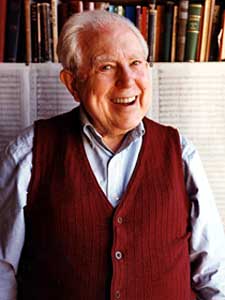Related Research Articles

Elliott Cook Carter Jr. was an American modernist composer who was one of the most respected composers of the second half of the 20th century. He combined elements of European modernism and American "ultra-modernism" into a distinctive style with a personal harmonic and rhythmic language, after an early neoclassical phase. His compositions are performed throughout the world, and include orchestral, chamber music, solo instrumental, and vocal works. Carter was the recipient of many awards – he was twice awarded the Pulitzer Prize for his string quartets. He also wrote the large-scale orchestral triptych Symphonia: sum fluxae pretium spei.

Walter Hamor Piston, Jr., was an American composer of classical music, music theorist, and professor of music at Harvard University.
Claude Monteux was an American flutist and conductor. Born in Brookline, Massachusetts, the son of conductor Pierre Monteux, Monteux studied flute with Georges Laurent, then the principal flutist of the Boston Symphony Orchestra. He studied conducting with his father, both privately and at the Monteux School for conductors.

Leroy Anderson was an American composer of short, light concert pieces, many of which were introduced by the Boston Pops Orchestra under the direction of Arthur Fiedler. John Williams described him as "one of the great American masters of light orchestral music."

Spartacus is a ballet by Aram Khachaturian (1903–1978). The work follows the exploits of Spartacus, the leader of the slave uprising against the Romans known as the Third Servile War, although the ballet's storyline takes considerable liberties with the historical record. Khachaturian composed Spartacus in 1954, and was awarded a Lenin Prize for the composition that same year. It was first staged in Leningrad on 27 December 1956, as choreographed by Leonid Yakobson, for the Kirov Theatre of Opera and Ballet, where it stayed in repertory for many years, but only with qualified success since Yakobson abandoned conventional pointe in his choreography. Yakobson restaged his version for the Bolshoi in 1962 and it was part of the Bolshoi's 1962 tour to New York. The ballet received its first staging at the Bolshoi Theatre, Moscow in 1958, choreographed by Igor Moiseyev; however it was the 1968 production, choreographed by Yury Grigorovich, which achieved the greatest acclaim for the ballet.

William Quincy Porter was an American composer and teacher of classical music.

Sir Eugene Aynsley Goossens was an English conductor and composer.
The Celebrity Series of Boston is a non-profit performing arts presenter established in Boston, Massachusetts by Boston impresario Aaron Richmond in 1938 as Aaron Richmond's Celebrity Series.

Aaron Richmond was an American performing arts manager, pianist, impresario, and educator, based in Boston, Massachusetts, who managed the careers of numerous classical musicians and founded Celebrity Series of Boston, a performing arts presenting organization that still operates today.

William P. Perry is an American composer and producer of television and film. His music has been performed by the Chicago Symphony, the Saint Louis Symphony, the Detroit Symphony and the symphonic orchestras of Cincinnati, Minnesota, Montreal, Calgary and Hartford as well as the Vienna Symphony, the Rome Philharmonic, the Slovak Philharmonic, the RTÉ National Symphony of Ireland and other orchestras in Europe.
Edward Burlingame Hill was an American composer.
La Boutique fantasque, also known as The Magic Toyshop or The Fantastic Toyshop, is a ballet in one act conceived by Léonide Massine, who devised the choreography for a libretto written with the artist André Derain, a pioneer of Fauvism. Derain also designed the décor and costumes for the ballet. Ottorino Respighi wrote the music based on piano pieces by Gioachino Rossini. Its world premiere was at the Alhambra Theatre in London on 5 June 1919, performed by Sergei Diaghilev's Ballets Russes.
Doriot Anthony Dwyer was an American flutist. She was one of the first women to be awarded principal chair for a major U.S. orchestra. She was the principal flute for the Boston Symphony Orchestra from 1952 until 1990. She was second flute for the National Symphony Orchestra and the Los Angeles Philharmonic. She was an adjunct professor of Music at Boston University.
Symphony No. 2 by Walter Piston is a symphony composed in 1943.
The Symphony No. 5 by Walter Piston was composed in 1954.
The Symphony No. 7 by Walter Piston is a symphony dating from 1960.
The Symphony No. 8 by Walter Piston is a symphony dating from 1965.
The Symphony No. 3 by Walter Piston was composed in 1946–47.
The Symphony No. 1 by Walter Piston was completed in 1937.

Spirit of the American Range is a classical music album by the Oregon Symphony under the artistic direction of Carlos Kalmar, released by the Dutch record label Pentatone on February 10, 2015. The album was recorded at the Arlene Schnitzer Concert Hall in Portland, Oregon in April 2013 and January 2014. It contains works by three American 20th-century composers: Walter Piston's ballet suite from The Incredible Flutist, George Antheil's "A Jazz Symphony", and Aaron Copland's Symphony No. 3. The recording was the third by the orchestra under Kalmar's leadership, following the highly successful Music for a Time of War (2011) and This England (2012). Spirit of the American Range received a Grammy Award nomination for Best Orchestral Performance, and its producer, Blanton Alspaugh, was nominated for Producer of the Year, Classical.
References
- ↑ Obituary for Walter Piston. The Musical Times, 118 (1607), 64 (January 1977).
- ↑ From Psalm to Symphony: A History of Music in New England
- ↑ Carter, Elliott (July 1946). "Walter Piston". The Musical Quarterly. XXXII (1): 354–375. doi:10.1093/mq/XXXII.3.354.